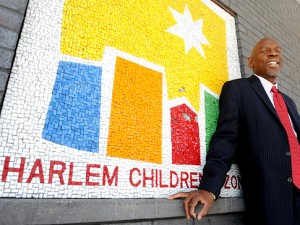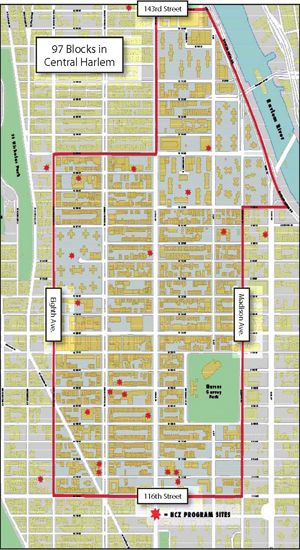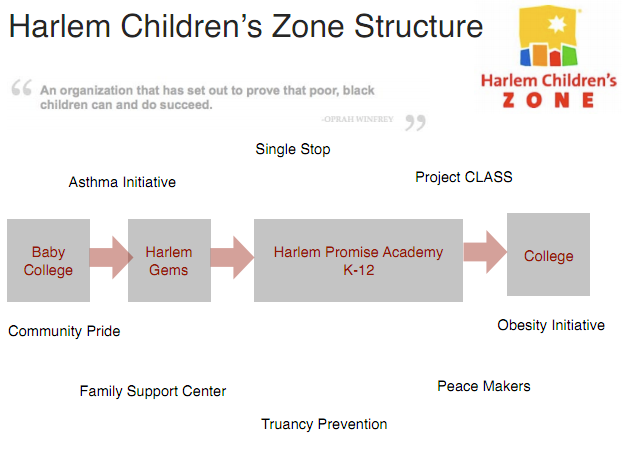In the spirit of expanding our blog to spotlight a successful entrepreneur, it's fitting that our first Entrepreneur in Focus be one who has been the subject of our previous blog posts on education reform. His name is Geoffry Canada. As the CEO of the Harlem Children's Zone he's helped to revolutionize the way a nonprofit enterprise can "change the trajectory of a poor child's future in an inner-city neighborhood."
YOUNG GEOFFRY CANADA
Geoffry Canada was raised by his mother, Mary, in Harlem, New York. Finances were tight. In the early years Mary struggled to support her four sons, and as a result Canada's early life was marked by poverty. She loved and cared for her boys, working hard to raise them with values. Limiting their television intake, tutoring them herself and taking them to civil rights rallies, she instilled in them the importance of education and concepts of social equality. Living in a poor, unsafe neighborhood Canada had to learn street smarts to stay safe.
In his teens he went to live with his grandparents in Freeport, Long Island where he excelled in school and won a scholarship. He continued his education at Bowdoin College where he earned a Bachelor of Arts degree in psychology and sociology in 1974. He also holds a Master's degree in education from the Harvard Graduate School of Education.
EARLY CAREER
After graduation Canada joined the faculty of Robert White School, an alternative school for troubled youth in Boston, Massachusettes. His ability reaching these students, especially the most violent ones, was a reason for his quick rise to the director position of Robert White.
In 1983 he returned to Harlem determined to make a difference in his old neighborhood. He wanted to help others succeed as he had. He got a job working for the Rheedlen Centers for Children and Families as a program director in the Truancy Prevention Program, and by 1990 had risen to President of the organization. Canada was unsatisfied with the scope of Rheedlen, and he began to make changes. The Rheedlen Center was renamed the Harlem Children's Zone and Canada shifted the entire makeup of the organization.
ENTREPRENEUR IN "THE GREAT SOCIAL EXPERIMENT": HARLEM CHILDREN'S ZONE BEGINNINGS
In an interview for the documentary film, Waiting for Superman, Geoffry Canada explains that he decided to go study what was wrong with the public education system so he "could fix it.” After earning a master’s degree from Harvard, he figured this would take “two, maybe three years.” That was over 35 years ago. NPR's This American Life did a segment on him for their "Going Big" show. Going big was what Canada realized needed to be done to reform education.
The idea came to him when he and his wife had a son. As the narrator on "Going Big" explains, Canada was in his 40's and things had changed for him. "He was no longer trying to make ends meet. He was now a well-educated, upper middle class guy living in a big home in the suburbs surrounded by trees and lawns and golf courses." As a dad he found out there was a ton of new research on the benefits of stimulating your child's brain at a young age, and it surprised him that everyone in the suburbs seemed to know about it. "They were obsessed with preparing their children," he explains. People in the suburbs were buying up every Baby Einstein product or other brain building toys for kids in sight.
Canada said he felt "overwhelmed" by all this new information and wondered how the parents they were working with in his organization were fairing in the "parenting revolution." He asked his staff to canvass the neighborhood and what they found was there was nothing. Abolutely no one was teaching anything - no best practices, no parental education, nothing - for moms and dads of 0-3 year olds. It dawned on him that places like Harlem "are often left out of the science of developmental education."
Canada said he felt "overwhelmed" by all this new information and wondered how the parents they were working with in his organization were fairing in the "parenting revolution." He asked his staff to canvass the neighborhood and what they found was there was nothing. Abolutely no one was teaching anything - no best practices, no parental education, nothing - for moms and dads of 0-3 year olds. It dawned on him that places like Harlem "are often left out of the science of developmental education."
At the same time Canada began rethinking his approach to social work. After so many years of frustration saving one child and having 10 more slip through the cracks he wondered if there was a tipping point, a point at which the the entire culture, the cycle of teen pregnancy and dropping out of high school could be altered. Could he reach 40 or 50% of these kids? He went to his board with these thoughts and the conclusion: we've been going about this the wrong way.
It was this revelation that led to the complete re-thinking of how they were approaching urban poverty and education reform. The two were intertwined. Middle class and upper middle class families had access to this information and talked about it openly. It completely passed over lower-income families. Kids in middle to upper middle class families have opportunities to continue to grow and develop after school with programs, clubs, sports and more. Kids from lower-income families are too often left unsupervised, because their parents, or parent, are working. Single parents in the neighborhood had little access, or knowledge, of support systems. What Harlem Children's zone aimed to do was provide a quality education for the children of Harlem as well as design a support network that is "designed to mimic the often-invisible cocoon of support and nurturance that follows middle class and upper middle class kids through their childhood" until they graduate college.
HARLEM CHILDREN'S ZONE PROGRESS AND PROGRAMS
Quoting from the HCZ Project web page: "The HCZ Project began as a one-block pilot in the 1990s, then following a 10-year business plan, it expanded to 24 blocks and then 60 blocks. The goal is to serve 15,000 children and 7,000 adults by 2011. The budget for the HCZ Project for fiscal year 2009 is over $40 million, costing an average of $3,500 per child."
The ambitious Harlem Children's Zone Project has expanded the comprehensive system of programs to nearly 100 blocks of Central Harlem and aims to keep children on track through and beyond college, as former students enter the job market. So, what programs and services are included in HCZ?
- Baby College, a series of workshops for parents of children ages 0-3
- Gems, an all-day pre-kindergarten program
- Harlem Peacemakers, reducing violence through negotiation skills and self defense classes
- Promise Academy, extended-day charter schools from kinder to 12th grade
- TRUCE Arts & Media, fostering career readiness through media literacy and artistic ability
- Employment & Technology, teaching computer and job-related skills to teens and adults
- College Success, an office that supports HCZ graduates throughout the college admission experience and during their college education
- Community Pride, organizes tenant and block associations
- Family Support, provides crisis intervention services, advocacy, groups on parenting and anger management training
- Asthma & Obesity Initiatives, educating families and providing management counciling
And there are many more. Read more about these programs and their success.This is significant because HCZ is now helping $1,200 students, 90% of which go on to attend college. The odds are in favor of college grads for breaking that cycle of poverty.
INSPIRATIONAL
Geoffry Canada's Harlem Children's Zone has been extraordinarily inspirational. president Obama launching promise neighborhoods program, 20 cities across US to mimic HCZ. Read more about promis neighborhoods here.




No comments:
Post a Comment